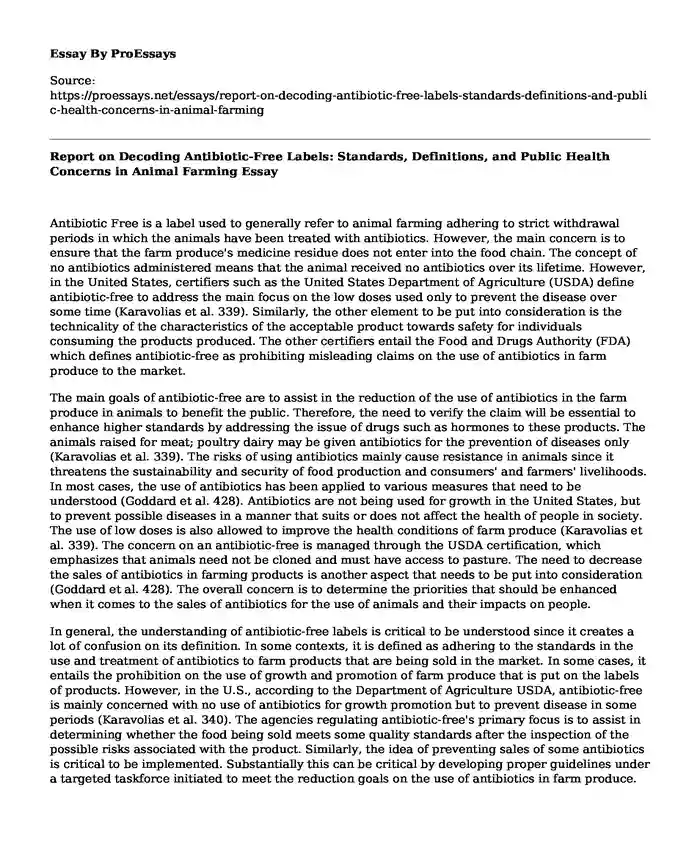Antibiotic Free is a label used to generally refer to animal farming adhering to strict withdrawal periods in which the animals have been treated with antibiotics. However, the main concern is to ensure that the farm produce's medicine residue does not enter into the food chain. The concept of no antibiotics administered means that the animal received no antibiotics over its lifetime. However, in the United States, certifiers such as the United States Department of Agriculture (USDA) define antibiotic-free to address the main focus on the low doses used only to prevent the disease over some time (Karavolias et al. 339). Similarly, the other element to be put into consideration is the technicality of the characteristics of the acceptable product towards safety for individuals consuming the products produced. The other certifiers entail the Food and Drugs Authority (FDA) which defines antibiotic-free as prohibiting misleading claims on the use of antibiotics in farm produce to the market.
The main goals of antibiotic-free are to assist in the reduction of the use of antibiotics in the farm produce in animals to benefit the public. Therefore, the need to verify the claim will be essential to enhance higher standards by addressing the issue of drugs such as hormones to these products. The animals raised for meat; poultry dairy may be given antibiotics for the prevention of diseases only (Karavolias et al. 339). The risks of using antibiotics mainly cause resistance in animals since it threatens the sustainability and security of food production and consumers' and farmers' livelihoods. In most cases, the use of antibiotics has been applied to various measures that need to be understood (Goddard et al. 428). Antibiotics are not being used for growth in the United States, but to prevent possible diseases in a manner that suits or does not affect the health of people in society. The use of low doses is also allowed to improve the health conditions of farm produce (Karavolias et al. 339). The concern on an antibiotic-free is managed through the USDA certification, which emphasizes that animals need not be cloned and must have access to pasture. The need to decrease the sales of antibiotics in farming products is another aspect that needs to be put into consideration (Goddard et al. 428). The overall concern is to determine the priorities that should be enhanced when it comes to the sales of antibiotics for the use of animals and their impacts on people.
In general, the understanding of antibiotic-free labels is critical to be understood since it creates a lot of confusion on its definition. In some contexts, it is defined as adhering to the standards in the use and treatment of antibiotics to farm products that are being sold in the market. In some cases, it entails the prohibition on the use of growth and promotion of farm produce that is put on the labels of products. However, in the U.S., according to the Department of Agriculture USDA, antibiotic-free is mainly concerned with no use of antibiotics for growth promotion but to prevent disease in some periods (Karavolias et al. 340). The agencies regulating antibiotic-free's primary focus is to assist in determining whether the food being sold meets some quality standards after the inspection of the possible risks associated with the product. Similarly, the idea of preventing sales of some antibiotics is critical to be implemented. Substantially this can be critical by developing proper guidelines under a targeted taskforce initiated to meet the reduction goals on the use of antibiotics in farm produce.
Work Cited
Goddard et al. ‘Public acceptance of antibiotic use in livestock production in Canada and Germany Proceedings in System Dynamics and Innovation in Food Networks 2017pp. 424–437.
Karavolias, Joanna, et al. "Raised without antibiotics: impact on animal welfare and implications for food policy." Translational Animal Science vol.2, no.4, 2018, pp.337-348.
Cite this page
Report on Decoding Antibiotic-Free Labels: Standards, Definitions, and Public Health Concerns in Animal Farming. (2023, Dec 16). Retrieved from https://proessays.net/essays/report-on-decoding-antibiotic-free-labels-standards-definitions-and-public-health-concerns-in-animal-farming
If you are the original author of this essay and no longer wish to have it published on the ProEssays website, please click below to request its removal:
- Annotated Bibliograpy on China's Social Policy
- Definition of Entrepreneurial Opportunity and Innovation Paper Example
- Emergency Ops Plans: Examining Florida County's Annexes - Essay Sample
- Former Employee Alleges TransCanada Unsafe Practices - Essay Sample
- Essay Sample on Conflict in Syria: Global Humanitarian Crisis & Threat to International Community
- Essay Example on Exploring the Depths of Robert Macfarlane's 'Underland': Red Dancers in Lofoten
- Essay Sample on 3 Sections of the Brain: Cerebrum, Brain Stem, & Cranial Nerves







